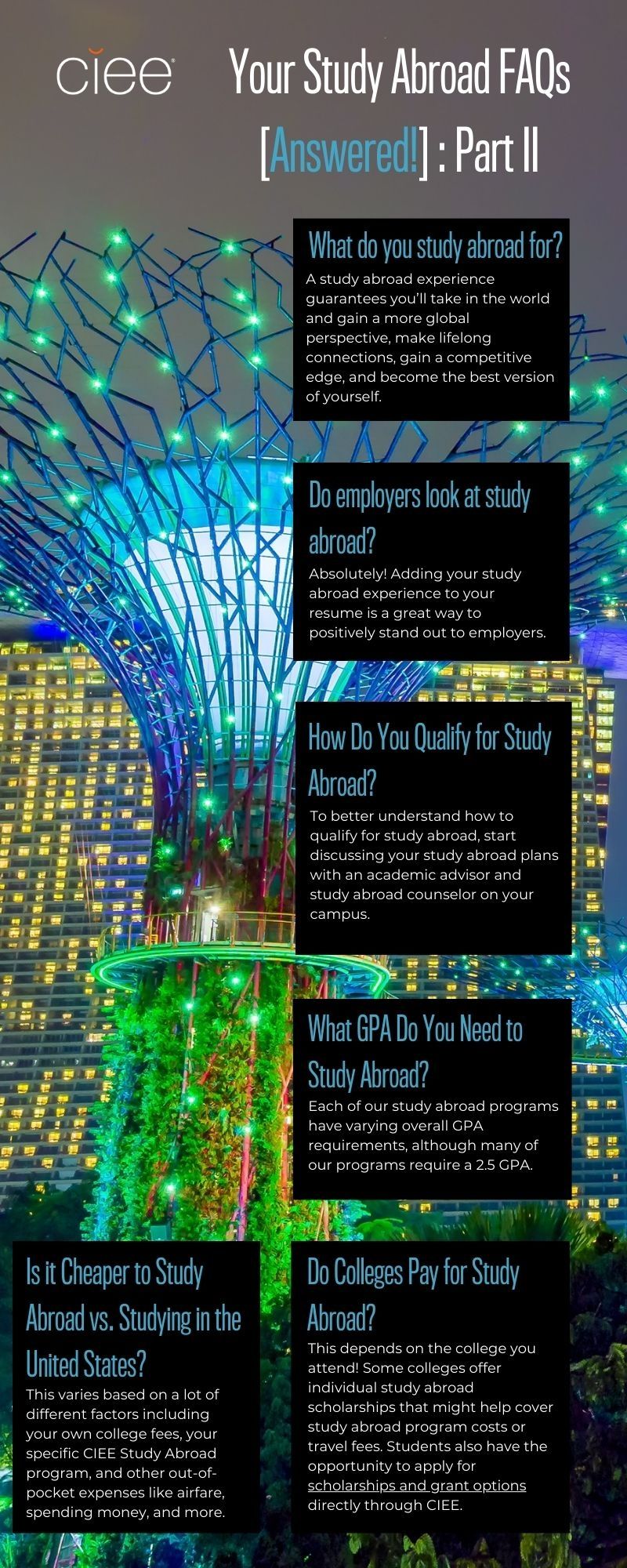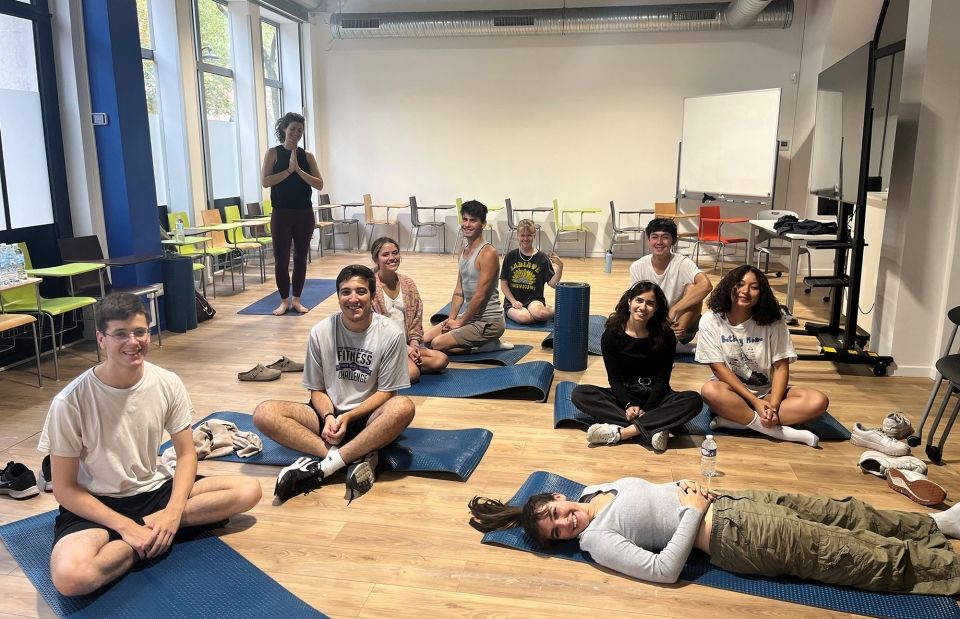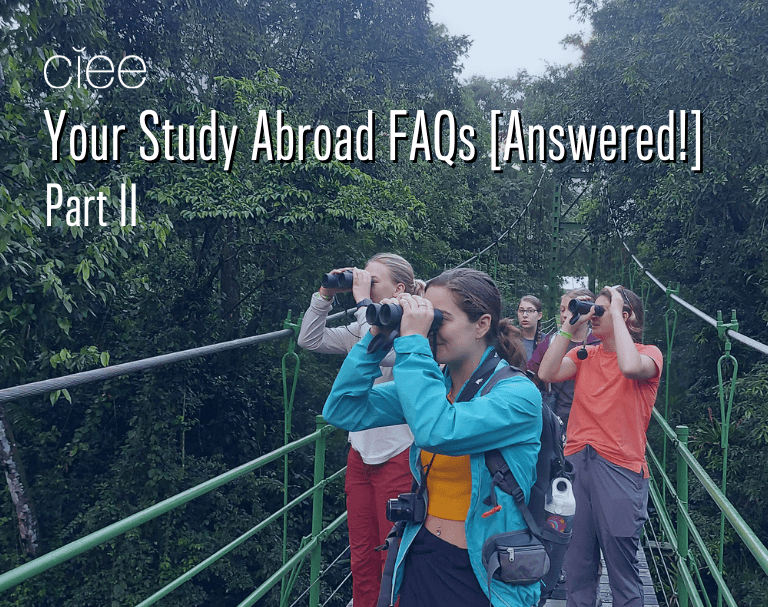Your Study Abroad FAQs [Answered!]: Part II
We get it. Embarking on the adventure of a lifetime raises some questions that require additional information. And that’s what we’re here to do! Read on as we answer your study abroad FAQs – Part II!

Read More: Your Study Abroad FAQs [Answered!]
What do you study abroad for?
The purpose of studying abroad is different for each student. Some students are passionate about learning new cultures, some really want to practice their language learning skills in a country that primarily speaks it, and others may simply want to experience living abroad while earning college credits.
No matter what your reason for studying abroad is, one thing is guaranteed: You will end the experience as a completely different person than when you started. And we mean this in the best way possible! A study abroad experience guarantees you’ll take in the world and gain a more global perspective, make lifelong connections, gain a competitive edge, and become the best version of yourself.

Read More: What are Your Goals for Studying Abroad?
Do employers look at study abroad?
Absolutely! Adding your study abroad experience to your resume is a great way to positively stand out to employers.
Learning the way of life in a new country shows adaptability; not to mention you’ll gain tons of confidence and independence while doing so. You’ll also be communicating with diverse groups of people each day, so your interpersonal skills and ability to work with multicultural groups will greatly improve.
Plus, studying abroad takes guts! As you live in a new and unfamiliar place and dive into academic work abroad, you’ll absorb a ton of new information and quickly learn how to problem-solve, which is a desirable quality in a future employee. Studying abroad will provide you with skills that will last a lifetime – both personally and professionally!
Read More: How to Put Study Abroad on Your Resume: 4 Steps
How Do You Qualify for Study Abroad?
To better understand how to qualify for study abroad, start discussing your study abroad plans with an academic advisor and study abroad counselor on your campus. They’ll be able to determine your eligibility for a study abroad program and ensure that the program you choose aligns with your academic goals.
They’ll also be able to go over important study abroad details with you – for example, specific program costs and GPA requirements – to best understand how you can plan your study abroad travels.
Talking with the experts at your school ahead of time will be key to understanding how to qualify for study abroad.
@cieestudyabroad Study Abroad FAQ: How do you qualify for study abroad? #ciee #cieestudyabroad #studyabroad #studyabroadprograms #college #studyabroadadvice #studyabroadtips #collegeadvice Lisztomania - Phoenix
Read More: What is Study Abroad? Everything You Need to Know!
What GPA Do You Need to Study Abroad?
Each of our study abroad programs have varying overall GPA requirements, although many of our programs require a 2.5 GPA. To better understand the requirements, talk with the experts on your campus to determine what your overall GPA is. If you meet our general minimum 2.5 GPA requirement, start browsing our study abroad locations and programs that best fit your personal and academic goals.
If you’ve always been dying to explore ancient Japan, look at our specific study abroad programs in the country to determine your eligibility. Or, if you’ve always been fascinated by a psychology-specific program in another country, filter your location and program search by subject, and see which study abroad programs you can qualify for with your GPA.

Read More: 5 Best Places to Study Abroad for Psychology
Do Colleges Pay for Study Abroad?
This depends on the college you attend! Some colleges offer individual study abroad scholarships that might help cover study abroad program costs or travel fees.
Again, the experts at your school can support you with this; your on-campus academic advisor and study abroad officer will have more details about different study abroad scholarships and financial aid available at your school. They’ll be able to point you in the right direction.
Students also have the opportunity to apply for scholarships and grant options directly through CIEE. In fact, we offer millions each year to help make students’ study abroad dreams a reality. Check out our options and make sure to fill out the scholarships and grant portion of your CIEE application!
Read More: Study Abroad Scholarships: Everything You Need to Know
Is it Cheaper to Study Abroad vs. Studying in the United States?
This varies based on a lot of different factors including your own college fees, your specific CIEE Study Abroad program, and other out-of-pocket expenses like airfare, spending money, and more.
So, to best break down whether it’s cheaper to study abroad vs. studying in the United States, it’s helpful to determine how much a semester costs on your campus. If you don’t know this off the top of your head, speaking with the experts, including your on-campus financial aid office, will help you determine this.
After establishing your institution costs, look at different CIEE programs. The cost you’ll see associated with different programs is CIEE’s one-time fee that covers most expenses, including:
- Tuition
- Housing
- Pre-departure advising
- Orientation
- On-site staff and 24/7 emergency support
- Culture and co-curricular activities
- Travel protection
Some of our short-term study abroad programs, like January (also known as J-term) programs, cost as low as $3,650, and some summer programs cost as low as $4,250. While this may be cheaper than a semester at your school, note that these programs are not considered semester programs, and fall in between traditional semesters.
However, if a short-term study abroad program makes the most financial sense for you, apply! You’ll be receiving extra credits toward your degree and exploring an entirely new city abroad. There’s no wrong time for a study abroad adventure.
Read More: Short-Term Study Abroad: Everything You Need to Know
Importantly, some of CIEE’s semester-long programs might still be less expensive than a semester at your institution! For example, our semester-long Liberal Arts program in the beautiful Dominican Republic costs as low as $13,950. Take a detailed look at our study abroad programs to help you nail down the total cost.
And don’t forget about CIEE’s robust scholarships and grant options to help support your study abroad trip. We also recommend budgeting as much as you can ahead of your travels to save some spending cash once you arrive at your incredible study abroad destination.
And CIEE support staff is always available to help you with any questions you might have.
@cieestudyabroad Study Abroad FAQ: Is it cheaper to study abroad vs studying in the US? #ciee #cieestudyabroad #studyabroad #studyabroadprograms #college #studyabroadadvice #studyabroadtips #collegeadvice Love Is Around Us - Animal Island
Read More: Top 10 Most Affordable Study Abroad Programs
Get on Your Way
It makes sense to have lots of questions as you plan a study abroad adventure. And we’re here to help! Lean on us and the experts on your campus to help you piece it all together. You got this. All that’s left to do is get started!
Related Posts
"Running as a lifestyle", Andrea Adam Moore, CIEE Center Director
Andrea Adam Moore is the Director of the CIEE Center in Berlin. She is one of the real "berliners" of the team, but also very connected to USA, after living... keep reading
Postcard from Abroad: Learning to Leave My Bubble in Berlin, Germany
By Vincent DiFonzo Almost every time I ride on Berlin’s metro system, the U-Bahn, I am reminded of one of the many little quirks of living in Germany—the German stare... keep reading
Kate Miller, Open Campus Student: “I have had a life changing experience during my time here”.
Kate Miller is one of our Open Campus students of this Fall Semester 2023. She has been studying and doing her internship at a local startup called Tuesday Coworking, environmentally-conscientious... keep reading



